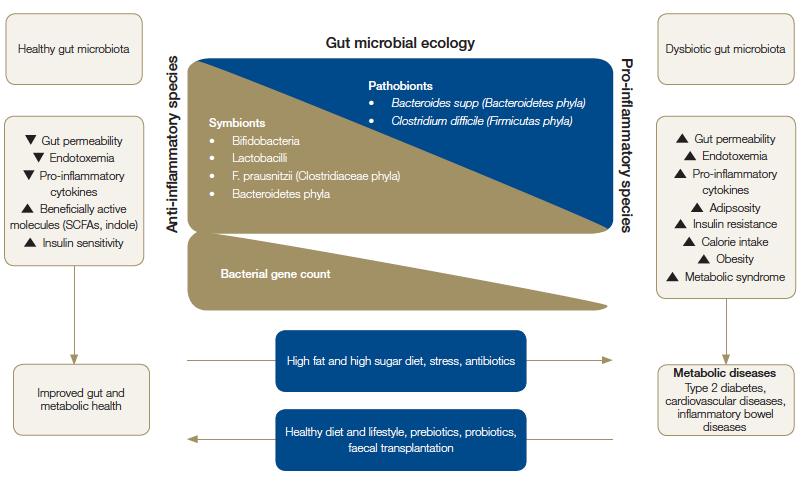Jodie Woodward ● 3 min read
The process of colonising microbes begins through microbial transmission from mother to baby. However, diet remains the key to shaping and defining gut flora diversity into adulthood.[2]
The normal human gut microbiota consists predominantly of two main phyla – bacteroides and firmicutes.[1] Bacteroides have a mainly positive role when retained in the gut3, while an overabundance of firmicutes may have a less positive effect on health.[4] Maintaining the right proportion of bacteroides and firmicutes strains is important, particularly when it comes to managing obesity and its associated metabolic conditions.[5]
Metabolic disease
Disorders of the gut microbiota have been linked to metabolic diseases like type 2 diabetes and obesity.[6] Metabolic diseases may occur in part due to stimulation of low-grade inflammation[6] as well as negative impacts on energy homeostasis caused by alterations to the gut microbiota.[4]
Obesity has been associated with an altered gut microbiota consisting of elevated levels of firmicutes and lower levels of bacteroides.[7] Firmicutes are more effective as an energy source, promoting efficient absorption of calories which can lead to weight gain.[4] Bacteroides can alter the gut environment to make it more hospitable for themselves and other microorganisms, as well as offering many health advantages, such as anti-inflammatory benefits.[3]
Manipulating the composition and diversity of the gut microbiota remains an important element in controlling the development of metabolic diseases.[1]
Prebiotics and probiotics
Probiotics are living microorganisms that promote the growth of positive types of gut microbes1 and have been used in treatment for obesity, insulin resistance, type 2 diabetes, and non-alcoholic fatty liver disease.[8]
Prebiotics are a non-digestible food ingredient that stimulates the growth or activity of bacteria in the colon, which work to reduce inflammation, improve gut barrier function and support the maintenance of appropriate body weight.[5,9]
A diet rich in fruits, vegetables and fibre is associated with a higher abundance and diversity of gut microbiota.[2] Further manipulating the gut microbiota through the use of prebiotics and probiotics is also very effective; these may be consumed as raw vegetables and fruit, fermented food and dairy products, supplements and functional foods.[8]
When used together, probiotics and prebiotics increase levels of short-chain fatty acids, ketones, carbon di-sulphides, and methyl acetates in the body, which results in positive health effects including improved hepatic and gastrointestinal health, as well as exerting anti-carcinogenic and antimicrobial effects.[8]
Bacteroides and firmicutes are just some of the many identified phyla found commonly in human gut flora that can have a profound effect on overall health. Breakthroughs in research continue to provide further evidence of ways in which we can promote gut flora growth and diversity.

Figure 1. Effects of a healthy gut microbiota on the gut and metabolic health of the host.[6]
References
- Hasan, N., & Yang, H. (2019). Factors affecting the composition of the gut microbiota, and its modulation. PeerJ, 7, e7502. [Full Text]
- Jandhyala, S. M., Talukdar, R., Subramanyam, C., Vuyyuru, H., Sasikala, M., & Nageshwar Reddy, D. (2015). Role of the normal gut microbiota. World journal of gastroenterology, 21(29), 8787–8803. [Full Text]
- Wexler, A. G., & Goodman, A. L. (2017). An insider’s perspective: Bacteroides as a window into the microbiome. Nature microbiology, 2, 17026. [Full Text]
- Koliada, A., Syzenko, G., Moseiko, V., Budovska, L., Puchkov, K., Perederiy, V., … Vaiserman, A. (2017). Association between body mass index and Firmicutes/Bacteroidetes ratio in an adult Ukrainian population. BMC microbiology, 17(1), 120. [Full Text]
- Barczynska, Renata., Kapusniak, Janusz., Litwin, Mieczyslaw., Slizewska, Katarzyna., and Szalecki, Mieczyslaw (2016) Dextrins from Maize Starch as Substances Activating the Growth of Bacteroidetes and Actinobacteria Simultaneously Inhibiting the Growth of Firmicutes, Responsible for the Occurrence of Obesity. Plant Foods Hum Nutr 71:190–196. [Full Text]
- Boulangé, C. L., Neves, A. L., Chilloux, J., Nicholson, J. K., & Dumas, M. E. (2016). Impact of the gut microbiota on inflammation, obesity, and metabolic disease. Genome medicine, 8(1), 42.
- Riva, A., Borgo, F., Lassandro, C., Verduci, E., Morace, G., Borghi, E., & Berry, D. (2017). Pediatric obesity is associated with an altered gut microbiota and discordant shifts in Firmicutes populations. Environmental microbiology, 19(1), 95–105. [Full Text]
- Markowiak, P., & Śliżewska, K. (2017). Effects of Probiotics, Prebiotics, and Synbiotics on Human Health. Nutrients, 9(9), 1021. [Full Text]
- Holscher, Hannah D. (2017) Dietary fiber and prebiotics and the gastrointestinal microbiota. Gut Microbes. 8(2): pp 172–184. [Full Text]
DISCLAIMER:
The information provided on FX Medicine is for educational and informational purposes only. The information provided on this site is not, nor is it intended to be, a substitute for professional advice or care. Please seek the advice of a qualified health care professional in the event something you have read here raises questions or concerns regarding your health.



